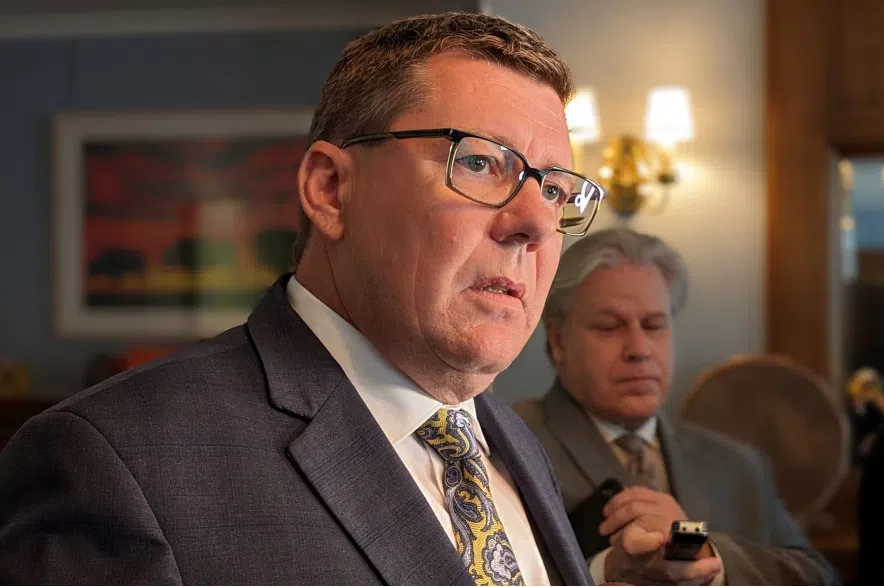Saskatchewan’s premier is suggesting the next steps after teachers voted against the latest contract offer from the province.
Scott Moe said binding arbitration is the “next logical step,” towards a contract agreement with the teachers.
“That will get all of us to an agreement as soon as possible. It’s for certain the fastest way (and) the fairest way,” Moe said during an appearance on the Evan Bray Show on Friday morning.
“I think it will provide that certainty for not only the rest of this school year, but into the future for our families across this province, for our students that are attending school, and for the teachers as well that are working and teaching our children.”
Listen to Scott Moe on the Evan Bray Show on Friday:
It is a change in tune from the province, which has previously rejected the idea of arbitration in the contract dispute, but Moe said that has changed now that a resolution is in sight. The federation previously proposed arbitration on just the issues of class size and complexity, which have been sticking points during the dispute, but the province turned down the offer, saying the best deals are struck at the bargaining table.
“Arbitration should not be your first place to go; however, at this point, we’re so close. We had an agreement at the table. We have a very close vote by the membership, he said.
“I think it’s a logical next step to provide that certainty in finding our way to an agreement. I would hope that that’s truly what everyone wants.”
The premier emphasized that the government wants to reach an agreement that is in the best interest of families, students, and teachers.
“We found what we thought was that agreement at the bargaining table between the Government Trustee Bargaining Committee and the Teachers’ Bargaining Committee,” he said.
“It was supported by the government. It was supported by the Saskatchewan Teachers’ Federation. Then we see it was a very close vote last night by their membership.”
Just 55 per cent of members voted to reject the offer for a three-year contract, which included salary increases of three per cent in 2023-24 and 2024-25, and a two per cent increase in 2025-26.
The offer would have also added another $18 million in annual provincial funding to address issues of classroom complexity – the number of students who need additional help beyond what teachers normally provide – which has been a sticking point throughout the contract dispute.
Federation president Samantha Becotte said the union remains committed to its efforts.
“I respect the decision that our collective made, and we are going to move forward together,” she said.
Becotte said the teachers’ union would return to the table if the Government-Trustee Bargaining Committee came back with a renewed mandate.
“If they are choosing not to return to the table, as I said, binding arbitration could be a path forward, but we will wait until we hear from them directly,” Becotte said.
Going into binding arbitration would mean teachers would not get a final vote, but Becotte insisted it is still a fair and judicial process.
Education Minister Jeremy Cockrill said the provincial bargaining committee will reach out to the STF bargaining committee immediately to talk about the possibility of binding arbitration.
“The government trustee bargaining (committee) appoints a member, the teachers’ bargaining committee appoints a member to the arbitration board, and then we work together to find a mutually agreeable chair of that arbitration board,” Cockrill explained.
“Both sides present their case, if you will, then that body goes through all the facts and determines a path forward.”
Cockrill said there’s been concern that instructional time for students has been affected this year due to sanctions from the federation, but he wouldn’t say whether the term would be extended in some school divisions.
“We want to work collaboratively with school divisions, and I know school divisions are working with their local teachers to make sure that students receive the education that they’re intended to receive this year,” he said.
“Nobody wants to go to summer school, right?”
NDP slams Sask. Party for not getting deal done
NDP education critic Matt Love was not happy to learn that the latest offer between the teachers and province didn’t pass.
“Parents, teachers and students all know that it was the Sask. Party government that created this crisis in our classrooms and they know the Sask. Party government can’t be trusted to fix it,” Love stated.
While the province is suggesting binding arbitration as the next step forward when it comes to getting a new deal – something the NDP has suggested as well – Love said he doesn’t understand why the province wouldn’t just go back to the table when the two sides appear close to an agreement.
“We called for binding arbitration back in March when the two parties were not at the table and they were at an impasse. At this point and time, we see progress being made at the bargaining table,” Love said.
“Minister Cockrill has said time and time again that the best deals are made at the bargaining table. I think the minister should listen to his own advice. I would encourage the government to get back to the table.”
–with files from 650 CKOM’s Shane Clausing and Lara Fominoff







